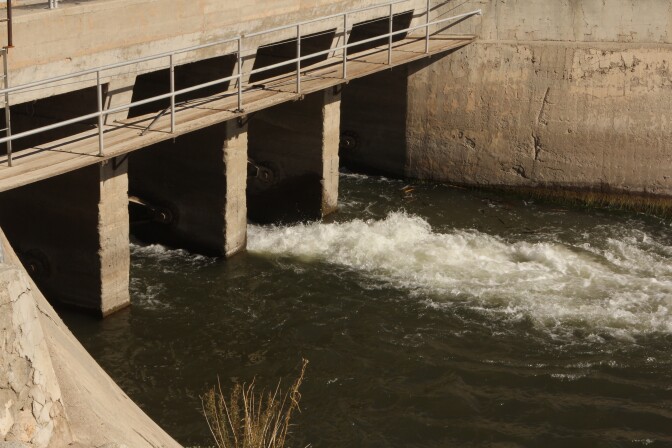This story is free to read because readers choose to support LAist. If you find value in independent local reporting, make a donation to power our newsroom today.
This archival content was originally written for and published on KPCC.org. Keep in mind that links and images may no longer work — and references may be outdated.
Why LADWP customers won't see a big snowmelt dividend on their bills

Although Los Angeles city water customers paid extra for costly imported water during the five-year drought, their water bills will drop very little now that the Department of Water and Power has a plentiful supply of its own, officials said.
The DWP surplus does not translate into big savings for individual bill payers because water rates were restructured last year. The new rates are intended to raise more money for water system improvements.
"The money that would have gone to purchased water is now going to infrastructure investment," said DWP spokeswoman Amanda Parsons.
Modest household savings on water bills
Typical water consumers will save less than $2 as DWP takes advantage of a record snowpack in the Eastern Sierra where much of the city's water supply originates. So much snow will melt and cascade down the Los Angeles Aqueduct that the DWP will not need to buy water from an outside agency.
" Thanks to the season’s formidable snowpack, LADWP water rates will decrease during the period of July through December, 2017 by $1.93 per month—from $76.50 to $74.57 for typical residential customers using 12 hundred cubic feet per month," Parsons said in an email.
In July 2015, before the rates were changed, a customer would have paid $60.16 for the same 12 hundred cubic feet of water. About 38 percent of that bill, or $22.86, would have been to cover the cost of purchased water
The new rate structure is designed to slowly increase water rates even as users consume less water. The new rates collect more for water system maintenance and improvements than before.
The absence of a snowmelt dividend for DWP customers did not sit well with Jack Humphreyville, who sits on a committee of Neighborhood Council members who keep watch on changes at the DMV.
"Trying to get an understanding of the new rate process is absolutely baffling," Humphreyville said, adding that his most recent water bill seemed high. "I just don't understand why, especially when DWP is going to be purchasing a lot less water from MWD."
The old rates charged all water consumers for the imported water, so no matter how careful customers were to limit their water use, they still paid a portion the bill for the water DWP purchased from the Metropolitan Water District.
The new rates push the imported water charges to the biggest water users. Water customers who keep their use to the most frugal first pricing tier are paying just for water from the L.A. Aqueduct, and not for imported supplies purchased from MWD.
A 2015 legal ruling in a case involving San Juan Capistrano's tiered water rates prompted the DWP to restructure how it bills for water. California's Proposition 218 requires government fees to be set according to actual costs.
To comply with the court ruling, DWP restructured its water rates to four tiers, each tier representing a different and increasingly more costly source of water.
The least expensive tier, Tier 1, includes the cost of water from the L.A. Aqueduct. Theoretically, if every single household in Los Angeles kept its indoor water usage to about 200 gallons per day and used no water outdoors, the water coming in from the L.A. Aqueduct would be sufficient.
Of course, many households use more. Those with water-conserving landscapes are likely to be in Tier 2, which is calculated on the cost of pumping and treating groundwater. Tier 3 customers are paying for imported MWD water. And Tier 4 customers pay for recycled water, which is the most expensive source.
Twice a year, the DWP Board of Commissioners reviews the different sources of water and adjusts rates. For example, if pumping and treating groundwater became less expensive, the rates for Tier 2 water could be reduced, the savings passed on to those users.








